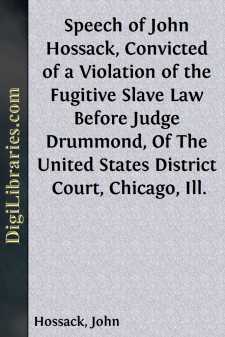Categories
- Antiques & Collectibles 13
- Architecture 36
- Art 48
- Bibles 22
- Biography & Autobiography 813
- Body, Mind & Spirit 142
- Business & Economics 28
- Children's Books 17
- Children's Fiction 14
- Computers 4
- Cooking 94
- Crafts & Hobbies 4
- Drama 346
- Education 46
- Family & Relationships 57
- Fiction 11829
- Games 19
- Gardening 17
- Health & Fitness 34
- History 1377
- House & Home 1
- Humor 147
- Juvenile Fiction 1873
- Juvenile Nonfiction 202
- Language Arts & Disciplines 88
- Law 16
- Literary Collections 686
- Literary Criticism 179
- Mathematics 13
- Medical 41
- Music 40
- Nature 179
- Non-Classifiable 1768
- Performing Arts 7
- Periodicals 1453
- Philosophy 64
- Photography 2
- Poetry 896
- Political Science 203
- Psychology 42
- Reference 154
- Religion 513
- Science 126
- Self-Help 84
- Social Science 81
- Sports & Recreation 34
- Study Aids 3
- Technology & Engineering 59
- Transportation 23
- Travel 463
- True Crime 29
Speech of John Hossack, Convicted of a Violation of the Fugitive Slave Law Before Judge Drummond, Of The United States District Court, Chicago, Ill.
by: John Hossack
Categories:
Description:
Excerpt
SPEECH OF JOHN HOSSACK.
[At the February term of the U.S. District Court for the Northern District of Illinois, JOHN HOSSACK and JOSEPH STOUT, of Ottawa, were convicted of having aided in rescuing a fugitive slave from the custody of the U.S. Deputy Marshal at Ottawa, Oct. 20, 1859, and sentenced by Judge Drummond to pay a fine of one hundred dollars, and be imprisoned ten days. Mr. HOSSACK is a Scotchman by birth, but spent many years of his life in Quebec, following the occupation of a baker. About twenty years since, he removed to Ottawa, Illinois, and assisted in the construction of the Illinois and Michigan Canal. He has been for some years past a prominent dealer in grain, has acquired a competency by enterprise and industry, and is considered one of the most upright and intelligent citizens in the community. The following Plea, made by him before the Court, evinces true nobility of soul, the highest moral integrity, the most generous humanity, and genuine manly eloquence. Let it be read in every household, so that the execution of the infamous Fugitive Slave Act, in every part of the North, shall be rendered impracticable by a regenerated public sentiment.]
MAY IT PLEASE THE COURT:
I have a few words to say why sentence should not be pronounced against me. I am found guilty of a violation of the Fugitive Slave Law, and it may appear strange to your Honor that I have no sense of guilt. I came, Sir, from the tyranny of the Old World, when but a lad, and landed upon the American shores, having left my kindred and native land in pursuit of some place where men of toil would not be crushed by the property-holding class. Commencing the struggle of life at the tender age of twelve years, a stranger in a strange land, having to earn my bread by the sweat of my brow, your Honor will bear with me. Unaccustomed as I am to appear in Courts, much less to address them, I have feared that I might fail in bearing myself on this occasion worthy of the place and the position I occupy, and the great principles involved in the case before you. I say to your Honor, therefore, if I fail in observing the usual forms of the place, it will be from a want of judgment and error of the head, and not of the heart. Therefore I do not think I shall fare worse at the hands of your Honor, if I state plainly my views and feelings on the great question of the age—the rights of man. I feel that it is a case that will be referred to long after you and I have gone to meet the great Judge of all the earth.
It has been argued by the prosecution that I, a foreigner, protected by the laws of my adopted country, should be the last to disobey those laws; but in this I find nothing that should destroy my sympathy for the crushed, struggling children of toil in all lands.
Surely, I have been protected. The fish in the rivers, the quail in the stubble, the deer in the forest, have been protected. Shall I join hands with those who make wicked laws, in crushing out the poor black man, for whom there is no protection but in the grave, where the wicked cease from troubling, and the weary are at rest...?


